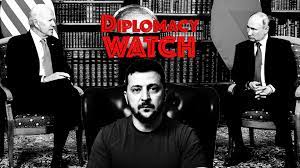Connor Echols
A group of Swiss lawmakers has moved forward a proposal to allow countries to give Swiss-made weapons to Ukraine, in a move that would soften Switzerland’s centuries-old policy of neutrality toward foreign conflicts.
“The majority of the committee believes Switzerland must offer its contribution to European security, which requires more substantial aid to Ukraine,” the Swiss parliamentary security committee said in a statement.
The decision would represent a significant break from the policy of Swiss neutrality, though its supporters insist that the measure would not violate their law of neutrality since Bern would not be sending weapons directly.
Switzerland’s neutrality has held strong since at least 1815, when Bern helped other European powers defeat Napoleon Bonaparte for the second and final time. Since then, the country has managed to avoid direct participation in any foreign conflict. Even during World War II, Bern studiously avoided taking sides in order to avoid being drawn into the war.
But the war in Ukraine has tested this policy. In May of last year, Swiss authorities agreed under pressure from the West to freeze the assets of several hundred sanctioned Russians, including President Vladimir Putin. Bern also closed its airspace to Russian planes.
Despite these shifts, allowing Swiss weapons to see the battlefield has so far been a red line. Last year, Switzerland denied several requests from Germany and Denmark to re-export Swi-ss-made arms to Ukraine. The country is currently considering a similar request from Spain, but leaders in Bern have signaled that Madrid’s petition is unlikely to be approved.
If passed, the proposal would create an exception whereby Swiss weapons could be re-exported to an active war zone as long as they are used to fight “a violation of the international ban on the use of force.”
In other diplomatic news related to the war in Ukraine:
— Russian Foreign Minister Sergey Lavrov visited South Africa Monday as the two countries prepare for joint military exercises, according to the Associated Press. The trip gave Moscow a chance to reinvigorate ties with South Africa, a key Russian partner in “a continent that is divided over the invasion of [Ukraine] and related Western isolation attempts,” argued Eleonora Tafuro, a senior research fellow at the Italian Insti-tute for International Politi-cal Studies. “[Russian] narratives [about] Western double standards & [patronizing] attitudes resonate well in Africa and speak to the history of the USSR helping anti-colonial movements,” Tafuro tweeted. “They are a key part of Moscow’s soft power strategy on the continent today.”
— Estonia and Latvia announced Monday that they will remove Russia’s ambassadors in their countries after Moscow asked E-stonia’s ambassador to le-ave over allegations of “Russophobia,” according to Politico. The pair will b-ecome the second and third Baltic countries to downgrade ties with Russia following Lithuania’s decision to expel its Russian ambassador in April of last year.
— Western officials want Ukraine to shift its focus away from Bakhmut in order to prepare for an offensive in the south, according to CNN. On Wednesday, shortly after CNN’s report came out, Ukraine conceded that it had lost Soledar, a key town outside of Bakhmut.
— In a major reversal, the U.S. and Germany agreed to send tanks to Ukraine despite concerns about how the move would be received in Moscow, according to the Associated Press. Ukrainian officials have now set their sights on modern Western fighter jets to replace or at least strengthen Kyiv’s Soviet-era fleet.
— Turkey’s foreign minister said it would be “mea-ningless” to restart NATO accession talks with Swe-den and Finland after a pr-otest in Stockholm in which a far-right activist burned a Quran, according to Reu-ters. Ankara’s tough talk m-ay be an effort to build support for embattled President Recep Tayyip Erdogan before elections in May.
U.S. State Department news:
In a Wednesday press conference, State Department spokesperson Ned Price said Washington is committed to improving ties with African countries that are skeptical of American policies, including those who have been historically tied to Russia. “The United States is ready, willing, and able to be a partner of first resort to the countries across Africa,” Price said. “We are not looking to use Africa as a new geopolitical stomping ground or playground. We’re not looking for relationships that are extractive, that export chaos, that export instability, that advantage only American private companies, as you’ve seen an approach taken by countries who have a different model.”







